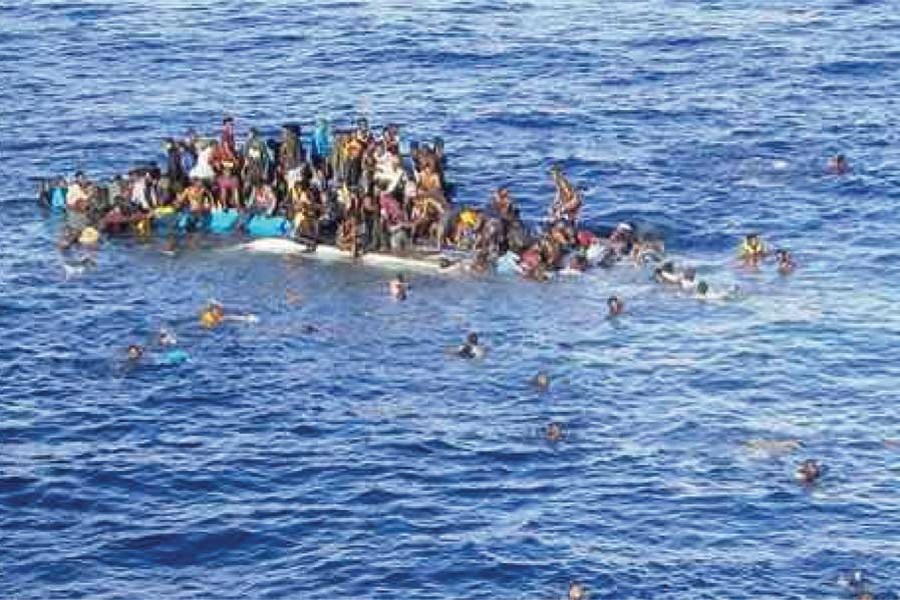For citizens of poor countries, migration often is a highly appealing option. The journey to a new country is often perilous, but it promises far greater economic opportunity: average per capita incomes in advanced economies can be more than 50 times higher (in terms of purchasing power parity) than those in the developing world. In many cases, migrants' physical security improves as well. Yet, for recipient countries, immigration remains a contentious topic, with governments struggling to settle on policies that will enable their economies to reap the benefits and avoid incurring excessive costs.
Immigration is a particularly salient topic of political debate in Europe and the United States. Even in Japan, which has largely closed its borders to migrants, the need to find ways to cope with rapid population aging has lately been stimulating discussion of the issue.
In all of these countries, the debate tends to boil down to three basic positions. The first - espoused by a small minority, and lacking significant political support - is that immigration is fundamentally beneficial to an advanced country, as newcomers can mitigate demographic challenges and contribute to the economy's skills base.
The second position is precisely the opposite: immigration should be prevented by all available means. Proponents of this view often argue that migrants drive down wages, particularly at the lower end of the income distribution, undermining natives' living standards. They also argue that migrants dilute the recipient country's culture and traditions - a claim with an emotional pull that economists often underestimate.
The third position falls somewhere between these extremes. It recognises the potential benefits of some immigration, but calls for strict proficiency tests, to ensure that only migrants who can fill a skills gap in the recipient country are accepted. That way, immigration will improve the quality of supply in the labour market and boost firms' competitiveness, without generating cultural pressures.
Of course, this approach looks quite different from the perspective of migrants' home countries, which lose not only valuable skilled labour, but also any resources invested in that labour, say, through the education system. While a country may benefit from its expatriates' remittances, it is the migrants alone who secure the overall benefits of relocating.
In any case, when advanced countries accept only a small number of skilled migrants, they do nothing to diminish the pressure that drives migration flows, which overwhelmingly comprise people who lack the new country's required skills. And those pressures are powerful, as demonstrated by the tragic situation in the Mediterranean Sea, where more than a thousand refugees on the treacherous route from Africa to Europe died in the first four months of this year.
If these pressures are allowed to persist, many migrants will ultimately make it to the developed world, one way or another. And while immigration liberals are right that migrants will help to ease demographic pressures in recipient countries, the prohibitionists are right that the newcomers will place considerable cultural stress on their new communities, particularly in Europe.
This is why any solution to the migration challenge must focus on spurring development in migrants' home countries. For Europe, the focus should be on Africa, the main source of migration flows. More rapid economic growth in Africa would, over time, greatly reduce the pressure that Europe faces. Africa's long-term development will of course require greater political stability and peace; in the meantime, however, there are steps that Europe can take to help spur growth.
While Africa has plenty of natural resources, it lacks the capital and knowhow needed to support a significant growth acceleration. Public resources are simply inadequate to supply the bulk of that capital. So, as has lately been recognised, investment must come from the private sector, as must critical skills and access to more developed markets. But tapping private investment requires the public sector to take some enabling steps, joined by the philanthropic sector, which also has significant resources to contribute.
This is not to say that public investment and philanthropy should subsidise inherently unprofitable projects. On the contrary, that would leave everyone worse off in the long run. The goal should be to identify projects that, despite being economically profitable, are unattractive to private investors, owing to institutional and other barriers, and then work to remove those obstacles.
One key barrier to private investment in Africa is risk. When the investment environment is considered uncertain, as is the case in most developing countries, investors demand a risk premium on virtually any project, even those with potentially high rates of return. Individual project risk is, after all, very difficult to measure in such a context.
The public sector can help with risk-pooling measures such as carrying certain tranches of risk or providing insurance. Such risk pooling, accompanied by institution-building across all sectors (not just health and education), could go a long way toward boosting economic growth and development in Africa and elsewhere.
The positive impact of this approach would be far-reaching - beginning with a reduction in migration pressure. The impact would be even greater if new investment targeted areas with the largest number of displaced persons and migrants-in-waiting, as proposed by a new "Commission on Forced Displacement".
Investment-driven growth is no substitute for conflict resolution and political stabilisation; on the contrary, the former cannot be sustained without progress on the latter. But an economic boost could serve as an important source of much-needed hope - and the start of a virtuous circle of peace and prosperity.
Kemal Dervis, former Minister of Economic Affairs of Turkey and former Administrator for the United Nations Development Programme (UNDP), is a vice-president of the Brookings Institution.
Copyright: Project Syndicate, 2017.
www.project-syndicate.org


